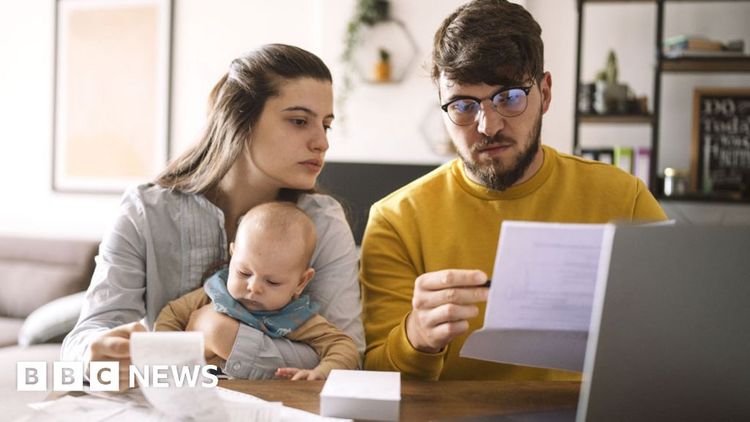Inflation slows to 4.6% as government says pledge met

The picture is from Getty Images.
Rewriting of Blog Section in Simplified English Written by Michael Race and Faisal Islam The COVID-19 pandemic has had a significant impact on businesses worldwide, with many companies struggling to finance their operations. However, small businesses have been disproportionately affected, facing challenges that are almost impossible to overcome. Small businesses are often based on a cash flow model. Therefore, the closure of physical shops and the loss of customers have resulted in a severe reduction of financial resources. While major brands have the backing of large corporations and can afford to weather the storm, smaller companies do not have that luxury. Governments across the globe have implemented measures aimed at supporting small businesses, such as grants and loans. While these initiatives have helped some companies, many have struggled to access this support. In addition, the support schemes are often only temporary, leaving small businesses uncertain about their long-term future. Therefore, it is essential for governments to consider the ongoing support needed by small businesses during and after the pandemic. Small businesses are vital to local communities and economies, providing jobs and services to individuals and families. Without ongoing support, many of these businesses will not survive the pandemic, resulting in job losses and a further decline in economies.

A journalist who specializes in covering business and economics for the BBC News.
In October, inflation in the UK dropped significantly, resulting in its lowest level in two years. This was primarily caused by a decrease in energy costs.
The inflation rate, which calculates how much prices of goods and services increase, decreased to 4.6% in October compared to the previous month's rate of 6.7%.
The government has declared that it achieved its promise to cut inflation by 50% before the year's end, ahead of schedule.
However, ministers can only claim credit for the decrease to a certain extent as energy prices stabilize.
According to experts in the field of economics, the reduction of inflation from its highest point of 11.1% in October 2022 can majorly be attributed to the dip in the energy price ceiling this month. This ceiling restricts energy providers from charging excessive amounts to consumers on a per unit basis.
Additionally, they mention the Bank of England's choice to increase their interest rates with the aim of decreasing demand within the UK economy and decelerating the growth of prices.
Currently, the interest rates are at a 15-year peak of 5.25%. This has caused an increase in mortgage expenses, but it has also resulted in elevated savings rates.
The BBC interviewed Paul Johnson, the head of the Institute for Fiscal Studies (IFS), a highly respected economic research organization. Johnson expressed his opinion that government officials do not hold much power when it comes to reducing inflation.
According to Grant Fitzner, who works as the top economist at the Office for National Statistics (ONS), there has been a decrease in the rate at which prices are increasing during October. This is due to the fact that the significant surge in energy costs observed in the previous year has been moderated by a slight reduction in the energy price cap this year.
He stated that the cost of food remained relatively stable in the previous month, but remarked that the prices for hotels had decreased.
Despite indications that the expenses of daily life may decrease, lots of households may not experience any financial relief, particularly with regards to their energy bills.
Even though gas and electricity costs are currently lower in comparison to the previous year, the majority of households are expected to pay more for energy expenses this winter. This is mainly due to the lack of government assistance to support bills.
A decrease in inflation doesn't necessarily indicate that buying most goods and services has become economical. Instead, it suggests a slower increase in prices.
According to James Smith, the director of research at the Resolution Foundation think tank, which concentrates on the livelihoods of low-to-middle-income people, the issue of the high cost of living is not yet resolved.
He stated that the extent of the inflation shock in Britain has resulted in a lasting impact of significantly increased prices.
In the last couple of years, the expense of power has increased by 49%, and at the same time, the prices of food items have gone up by 28%. This is much higher than the 14% growth in average earnings during this time.
Dave Golding is the individual who manages the Patch food bank charity.
According to Dave Golding, the supervisor of a charity called Patch food bank located in Milford Haven in Wales, individuals are still struggling to cope with the increased cost of food and energy. The charity is expected to give out a total of 150,000 meals by the end of the year.
The speaker informed the BBC that they experienced an extraordinary year with regards to food parcels in the previous year and did not anticipate much difference in the current year.
Many individuals are making an effort to conserve their energy usage. It can be challenging for individuals to have their stove on for an elaborate meal.
In January, when Rishi Sunak promised to decrease inflation by fifty percent by the year's end, several specialists had already foreseen the decline in the rate.
In response to the most recent statistics, the leader of the government stated that making this promise happen had been his most important goal, which had involved making tough choices and being careful with spending.
Jeremy Hunt, the Chancellor, stated that the government has had a significant impact by being careful with spending, aiding individuals in obtaining employment, and refusing demands for more borrowing.
However, Mr. Johnson from IFS described the promise as "exploitative" since there was already a predicted decrease in the inflation.
Labour's Rachel Reeves, who serves as the shadow chancellor, has expressed that it is not yet time for Conservative ministers to celebrate and commend themselves. She seems to imply that there is still more work to be done.
Although it is now October and the weather is getting colder, the United Kingdom is still quite far from reaching the 2% inflation goal that the Bank of England has set. The people in charge of monetary policy at the Bank of England have mentioned recently that they do not anticipate any decreases in interest rates in the near future.
According to the ONS, the cost of food and energy has not decreased to the level it was two years ago. Moreover, there is a potential likelihood that the energy price limit for the upcoming year, which will be made public next week, might indicate a further increase in energy charges.
The rate of inflation in the UK is currently higher than it is in other nations such as the United States, France, and Germany.
Can't Pay Energy Bill? What To Do?
Have you been impacted by inflation? Would your spending habits change if there was a decrease in inflation? Feel free to share your personal encounter by sending an email to [email protected].
If you're okay with speaking to a BBC journalist, kindly provide a contact number. In addition to that, there are other ways to reach out to us, which are listed below:
In case you are unable to view the form while reading this post, kindly access the mobile edition of BBC website to share your queries or opinions. Alternatively, you can also send us an email at [email protected]. It would be appreciated if you could mention your name, age and location along with your submission.









































